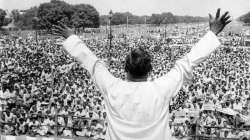Atal Bihari Vajpayee's 7 unmissable speeches
Two years have passed since the death of Former Prime Minister Atal Bihari Vajpayee. An orator par excellence, Vajpayee used witty remarks with aplomb for political satire on his opponents that often won him accolades and hearts of many. He often trumped the questioner that helped tide over tough questions posed to him and defuse the situation. We are taking you a trip down those powerful speeches that you must be missing.

Two years have passed since the death of Former Prime Minister Atal Bihari Vajpayee. An orator par excellence, Vajpayee used witty remarks with aplomb for political satire on his opponents that often won him accolades and hearts of many. He often trumped the questioner that helped tide over tough questions posed to him and defuse the situation. We are taking you a trip down those powerful speeches that you must be missing.
- 'Satta ka khel chalega' (the game of power will go on). Governments will come and go. Parties will be made and unmade. This country should survive, its democracy should survive." [Vajpayee in Lok Sabha when his government faced a trust vote in May 1996].
- The Pokhran-2 nuclear tests were conducted neither for self-glorification, nor for any display of machismo. But this has been our policy, and I think it is also the policy of the nation, that there should be minimum deterrence, which should also be credible. This is why we took the decision to conduct tests. [In Parliament on the 1998 nuclear tests]
- You can change friends but not neighbours. [In Parliament in May 2003]
- We in India are inheritors to a great civilisation whose life chant has been 'Shanti' - that is, Peace - and 'Bhaichara' - which means, Brotherhood. India has never been an aggressor nation, a coloniser or a hegemon in her long history. In modern times, we are alive to our responsibility to contribute to peace, friendship and cooperation both in our region and around the world. [31 January, 2004 - PM's speech at inauguration of Global Convention on Peace and Non-violence].
- The freedom of the press is an integral part of Indian democracy. It is protected by the Constitution. It is guarded in a more fundamental way by our democratic culture. This national culture not only respects freedom of thought and expression, but also has nurtured a diversity of viewpoints unmatched anywhere in the world.
- Gun can solve no problem; brotherhood can. Issues can be resolved if we move forward guided by the three principles of Insaaniyat (humanism), Jamhooriyat (democracy) and Kashmiriyat (Kashmir's age old legacy of amity). [April 23, 2003 - speaking on the issue of Jammu and Kashmir in Parliament].
- Education, in the truest self of the term, is a process of self-discovery. It is the art of self-sculpture. It trains the individual not so much in specific skills or in specific branch of knowledge, but in the flowering of his or her latent intellectual, artistic and humanist capacities. The test of education is whether it imparts an urge for learning and learnability, not this or that particular set of information. [December 28, 2002 - inaugural speech of the Golden Jubilee Celebrations of the University Grants Commission]